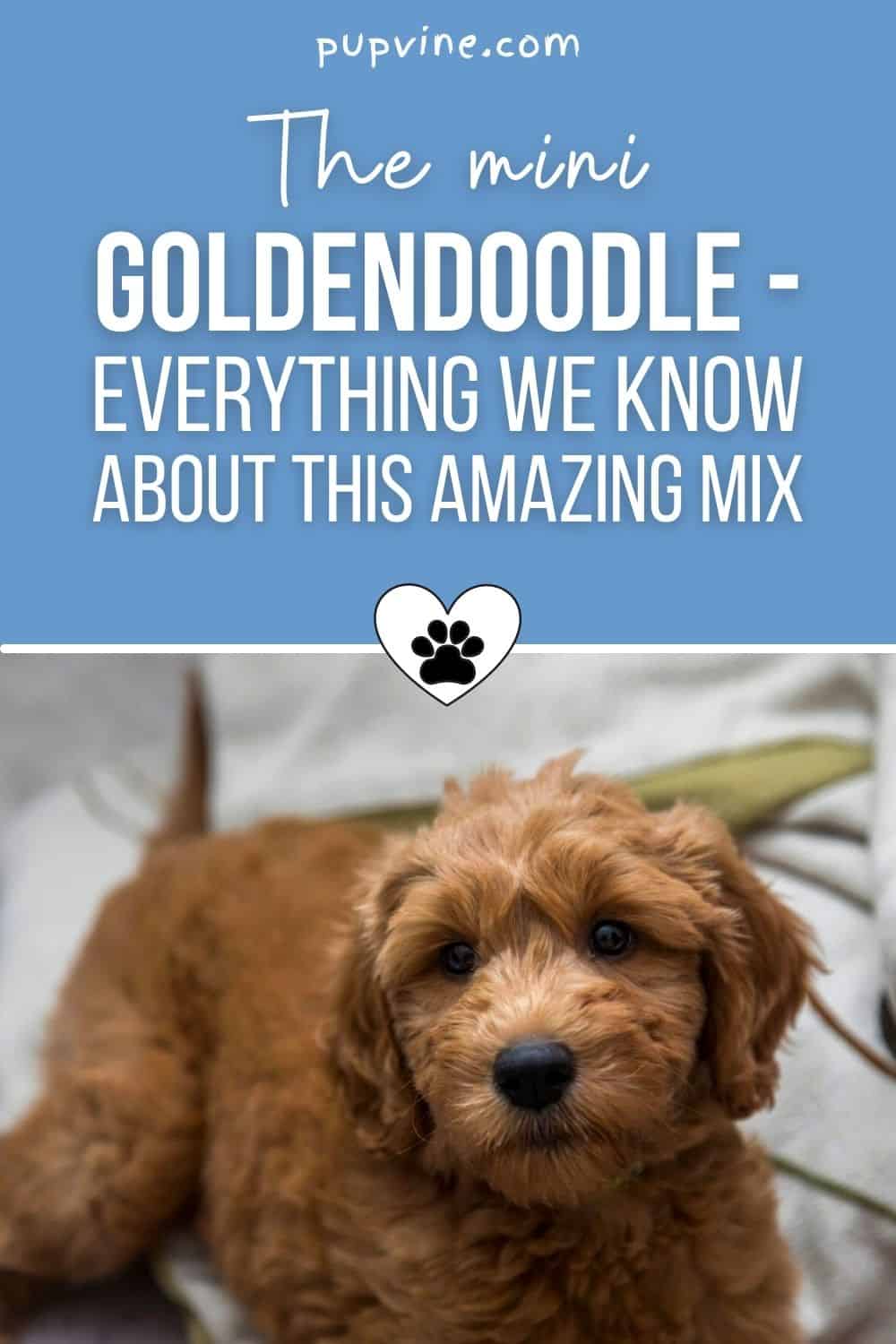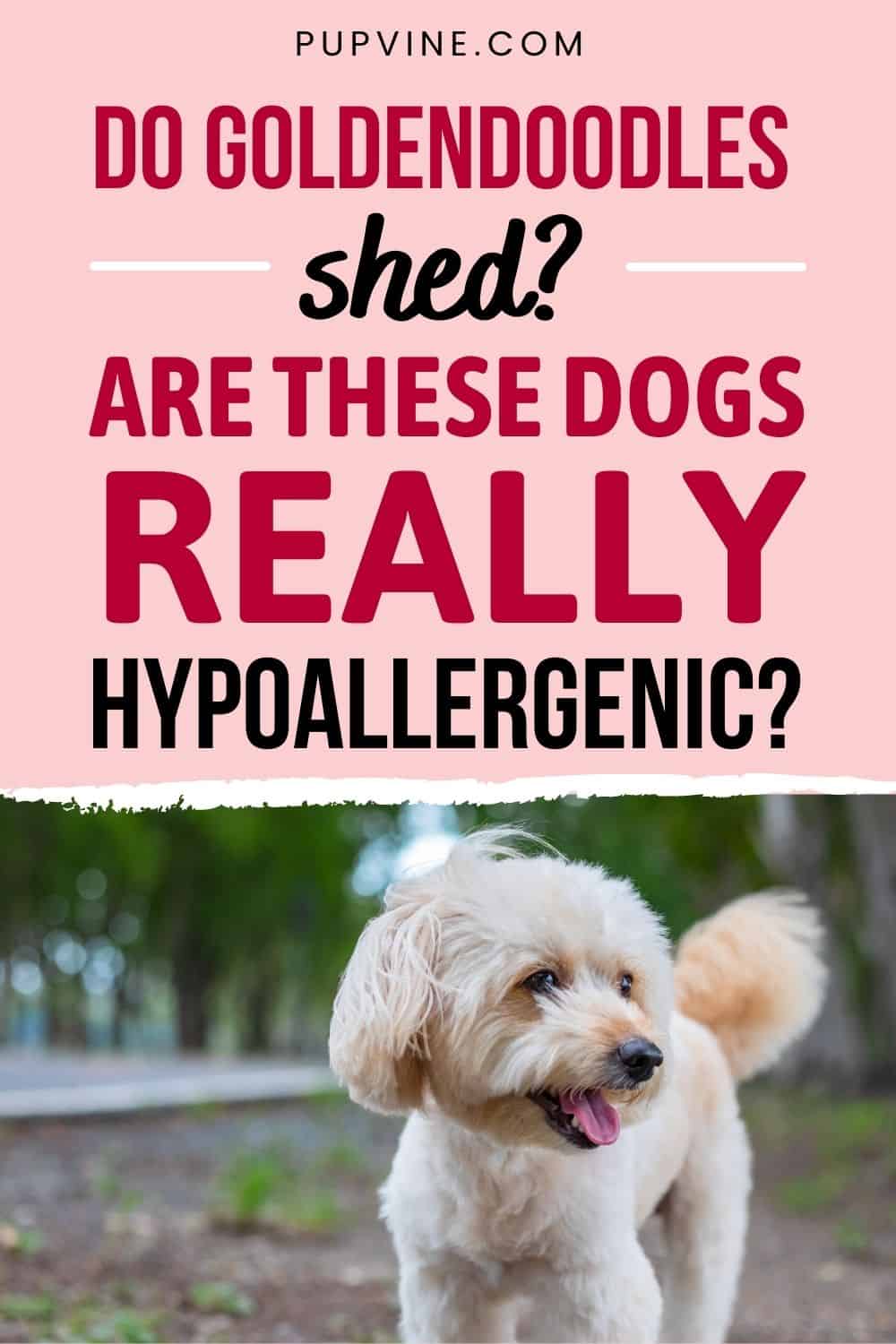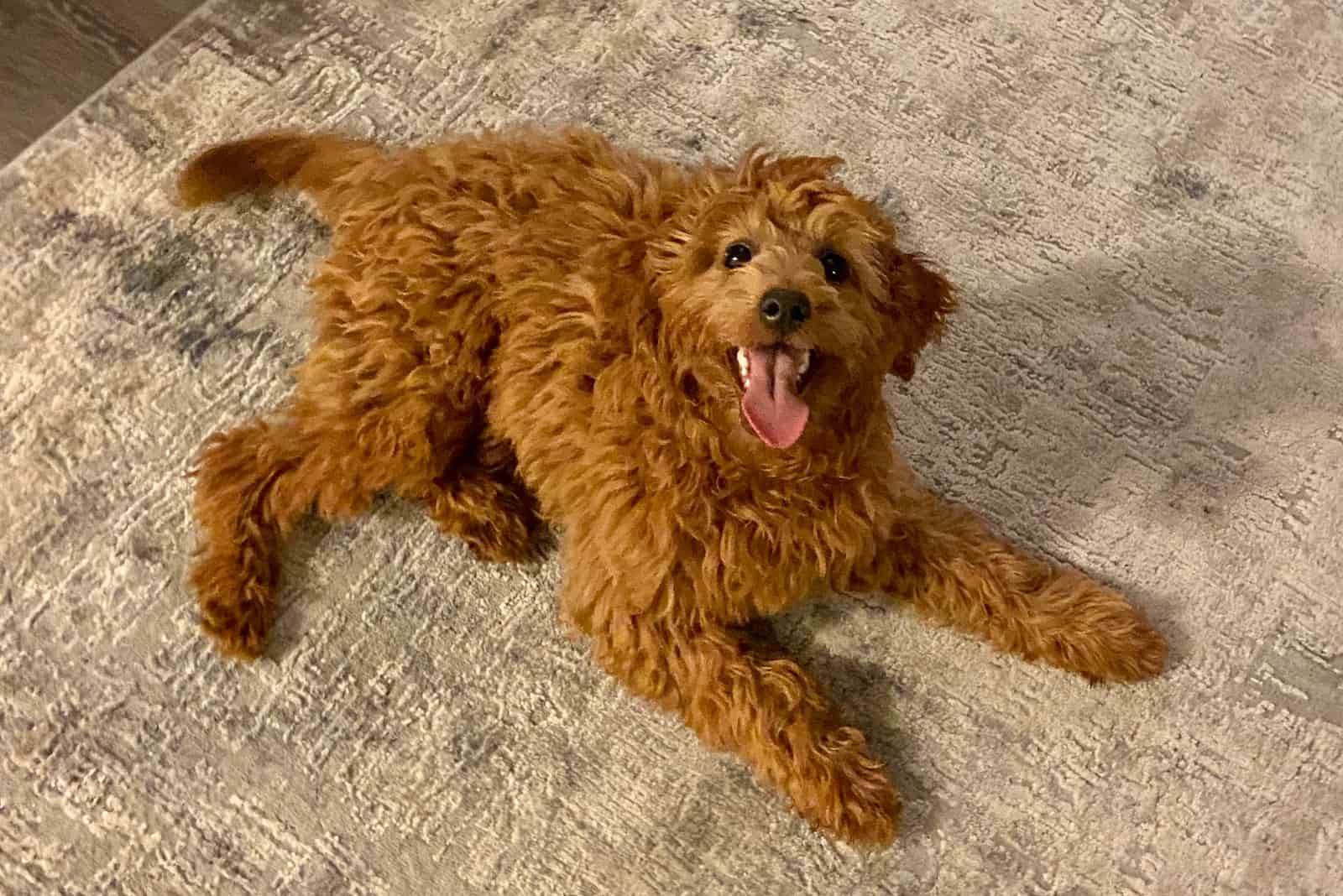Doodle dogs have become a common sight over the last few decades, and the Goldendoodle is one of the most popular designer dog breeds going. For those who don’t know, it’s a mixed breed dog that crosses the Golden Retriever with the Standard Poodle.
These Poodle mixes are prized for their loveable and affectionate nature and for their curly coats that are believed to be a good choice for people with pet allergies.
We’ll explore the subject of hypoallergenic dogs later, as there’s a lot of confusion surrounding this term.
Before we get there, we need to answer our primary question, do Goldendoodles shed?
Do Goldendoodles Shed?
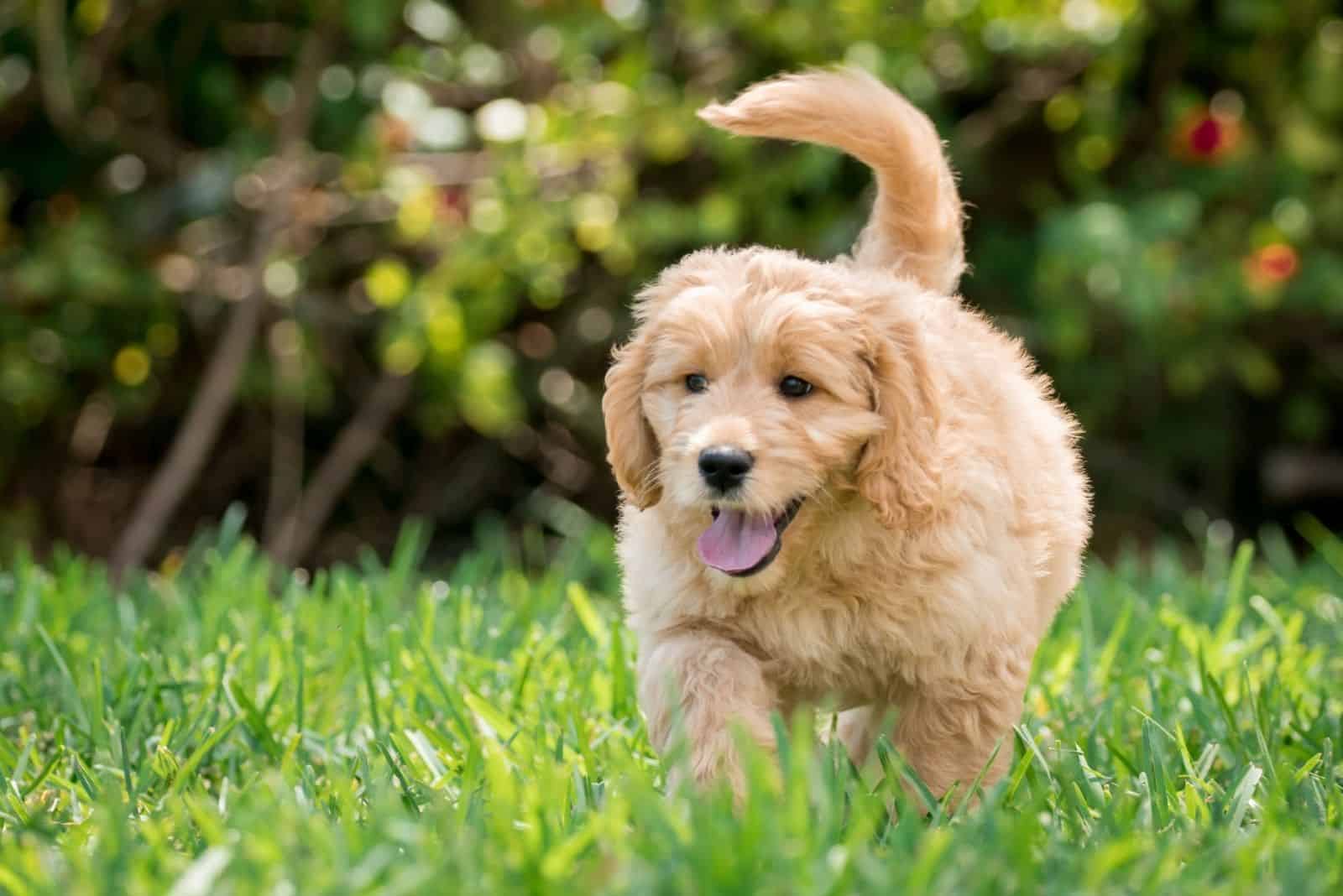
Let’s be as clear as we can: yes, Goldendoodles do shed. No matter if you’re talking about a male or a female Goldendoodle, they will shed. In fact, all dogs shed to some degree, even hairless dogs!
Dog hairs go through a lifecycle and eventually die, replaced by new hairs. The loose, dead hairs fall out and stick to clothes, furniture, and rugs. In addition, many dogs shed in spring and fall as their coats prepare for the changes in the seasons.
However, the amount of shedding varies between dog breeds. For example, German Shepherds, Labradors, Great Pyrenees, and Chow Chows are very heavy shedders.
On the other hand, Afghan Hounds, Bichon Frise, Maltese dogs, and Schnauzers are all low-shedding dogs.
Oddly enough, the parent breeds of the Goldendoodle fall on either side of this divide, as Poodles are low-shedders and Golden Retrievers are on the heavy-shedding team!
As a result, a Goldendoodle puppy might be born with one of three types of coat: straight, wavy, or curly. Those that favor the Poodle parent have a curly or wavy coat that sheds very lightly.
How Much Do Goldendoodles Shed?
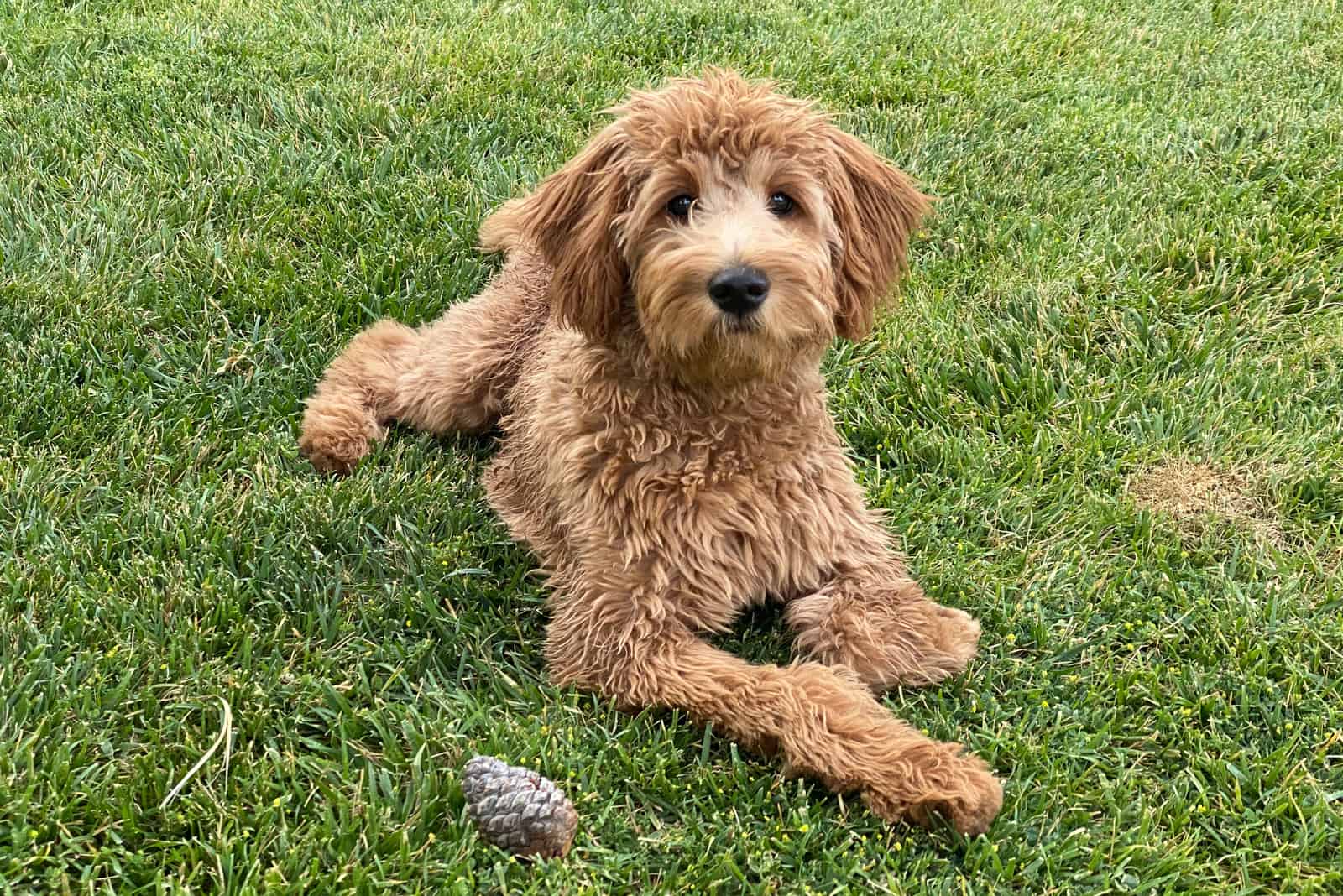
Although they shed all year-round, the Goldendoodle’s coat is generally low-shedding. Dead hairs at the end of their lifecycle detach from the follicle, but they stick in the curls and need to be brushed out.
So, these dogs don’t shed much, and the hairs that fall out can be collected when you brush your dog. Compared with other breeds, the Goldendoodle is one of the best choices if you don’t want dog hair all over your home!
Unlike its Poodle parent, the Goldendoodle has a double coat (purebred Poodles have a thick, single coat) that needs care and attention to remove dirt and debris. They are also prone to matting, which is painful for the dog as it pulls on the skin.
Regular brushing is essential for a clean, tangle-free coat. It also spreads natural oils through the fur that keep the hairs healthy and extends their lifecycle, resulting in even less shedding!
My Goldendoodle Sheds A Lot!
If Goldendoodle owners find that their pooches are shedding much more than usual, it’s usually a sign that something is wrong.
Here are a few examples:
• Parasites – Fleas, ticks, and mites cause irritation that makes dogs scratch. Aside from pulling out hair, this causes inflammation and broken skin, resulting in damaged hair follicles that can’t hang on to hair.
• Skin infections – Fungal and bacterial infections damage the skin and hair follicles, as in the case of parasites.
• Hormone imbalance – Health conditions like hypothyroidism can cause excessive hair loss as the dog isn’t producing enough of a specific hormone.
• Malnutrition – A lack of essential nutrients in your dog’s diet can affect its coat. Always feed your furry friend high-quality dog food, and make sure it contains omega-3 fatty acids. If necessary, invest in nutritional supplements to keep your dog’s skin and coat healthy.
• Sunburn – Dogs with a Poodle coat can be clipped, though there is a risk of sunburn if it’s too short. Once again, this damages the skin and can cause hair loss.
• Anxiety And Stress – These are common problems that many dog owners overlook. Dogs become anxious and stressed over many things, such as loud noises, traveling, being left alone, and changes in routine. These can affect their mental health, which shows in physical ways, like an increase in shedding.
If your pooch suddenly shows an increase in shedding, check them for signs of infection or parasites. Your vet will be able to help you out and prescribe treatment to fix the problem.
They can also provide medication for conditions like hypothyroidism and advise you on the correct nutrition for your dog.
As for sunburn, you’ll need to take extra care in strong sunlight and avoid clipping your furry pal’s coat too short in summer.
Finally, try to reduce stress and anxiety as much as possible by sticking to a routine and making your fur baby feel safe and comfortable. Avoid leaving them home alone for too long, and ask friends, family, or neighbors to drop by to keep your dog company for a while.
Goldendoodle Grooming
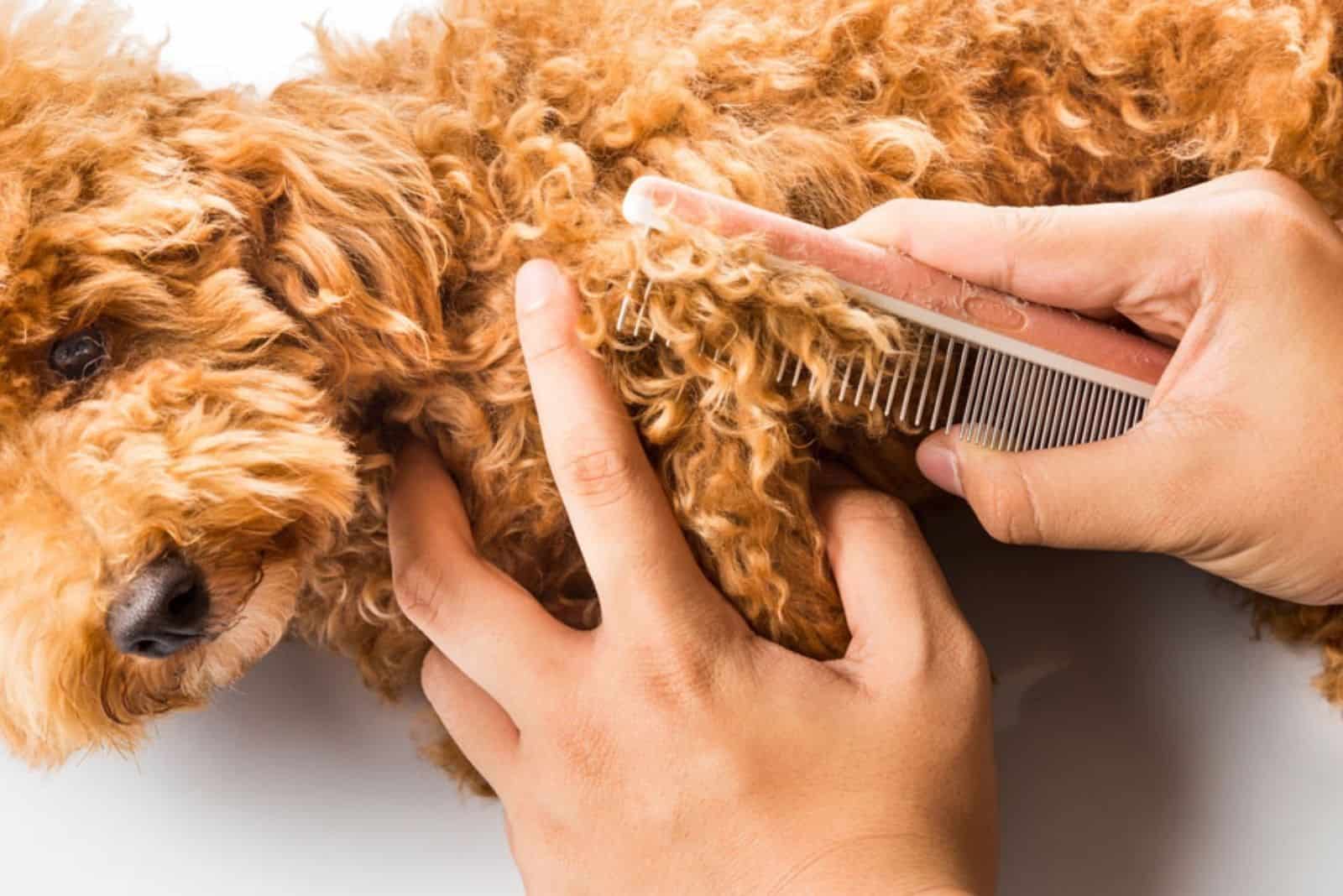
Regular brushing is essential to keeping a dog’s coat in good condition, and even a low-shedding coat needs regular care and attention.
This Doodle dog’s wavy or curly coat catches the dead hair, so you’ll need to brush this out regularly. Weekly brushing is okay, but it’s better to do this at least a couple of times a week.
You may notice a slight increase linked to seasonal shedding, probably in spring, but it should never be too bad. This will be more likely in Goldendoodles with straight coats like their Golden Retriever parent.
Although it’s not entirely necessary, you could invest in a de-shedding tool for occasional use, as this will catch all those loose hairs. Otherwise, a good-quality slicker brush will do the trick.
It’s always best to establish a grooming routine early as it gets your puppy used to the process. While some dogs are okay, others aren’t too happy about it!
Grooming is an excellent time to bond with your pet. You can also use the time to check for any signs of illness or infection.
Do Mini Goldendoodles Shed?
Yes, just like their larger counterparts.
Mini Goldendoodles are a cross between the Golden Retriever and the Mini Poodle, so there’s no reason to suspect they will shed any more or less than the bigger version.
Even so, it may seem as if they shed a lot less, as they are smaller dogs.
As the result, Micro Goldendoodles will shed even less as they are even smaller! The same goes for petite Goldedoodles and other small types of Doodles.
When Do Goldendoodle Shed Their Puppy Coat?
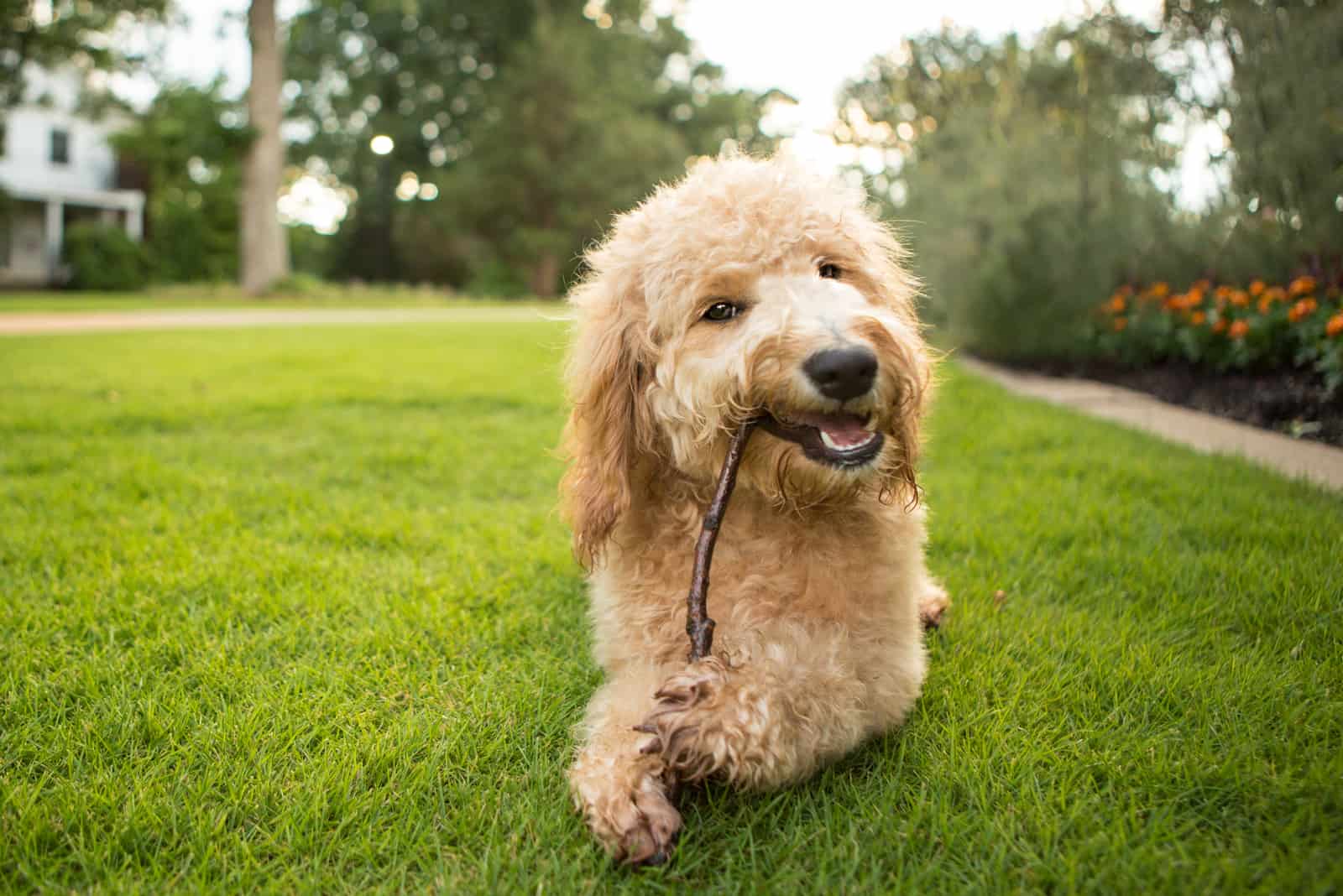
Sometime between four and eight months of age, your Goldendoodle puppy will lose that fluffy puppy coat.
This process will take as long as it takes; some dogs will get it over with quickly, while others will take their time. It could be over in a couple of weeks, or it may take months!
During this time, there may well be a lot of dog hair around! However, it will soon be over, and your furry companion will have its adult coat. If you’re fortunate, you’ll barely even notice the change. Each puppy is different, and you won’t know until you reach this stage.
Are Goldendoodles Hypoallergenic?
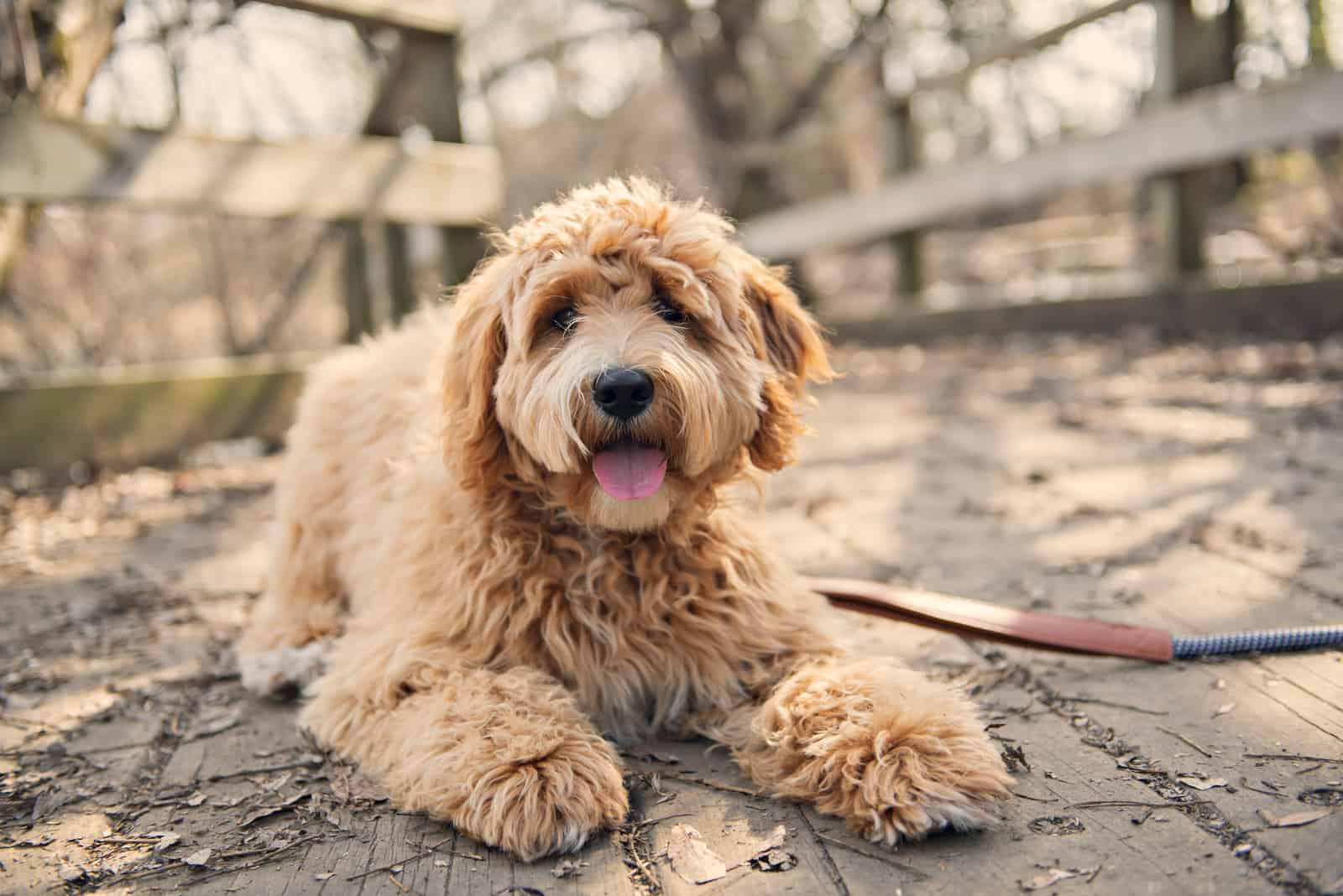
The best answer we can give is probably.
Honestly, there’s still so much garbage spouted online about this subject that it’s not easy to find the truth!
However, let us explain the facts:
The word hypoallergenic applies to anything specifically designed to have a minimal impact on people with allergies. So, we have hypoallergenic jewelry, band-aids, toys, cosmetics, clothes, etc.
You can also have naturally hypoallergenic items, as they are not known to trigger any allergic reactions.
Hypoallergenic: The REAL Meaning
The trouble is that there is no legal or scientific definition of the term. It can’t be accurately measured, and it only means that the item is less likely to trigger an allergic reaction – there are no guarantees.
So, if your Goldendoodle has a curly coat like the Poodle, and it sheds less hair and dander, it can be described as hypoallergenic.
As with those who claim that some dogs are non-shedding, you should ignore anyone who uses the phrase, no dog can be completely hypoallergenic, as it makes no sense!
What they mean is that no dog can ever be 100% allergy-free.
Debunking The Myths
Let’s try to end these myths for good:
• “Dog breeds that shed can’t be hypoallergenic.” This is false! As we know, all dog breeds shed, and many are still hypoallergenic.
• “Dog hair causes allergies.” No, that’s not right. People aren’t allergic to dog hair; it’s a protein in the dog’s dander, saliva, urine, and feces that causes the problem as they contain allergens in the form of proteins. Dander sticks to the dog hair and sets off your allergy when you come into contact with it. Therefore, dogs that don’t shed as much (and produce less dander) are far less likely to cause an allergic reaction.
• “You can’t be allergic to hypoallergenic dogs.” Sadly, this is not true. It depends on how severe your allergies are. Someone with very mild allergies may not have a reaction, while another person may suffer badly.
• “My dog is 100% hypoallergenic.” This shows a complete misunderstanding of the word. As we said above, a dog is allergy-friendly, or it’s not. Certain breeds are less likely to trigger a reaction, but this quality can’t be measured accurately, if at all. Therefore, the terms’ truly hypoallergenic’ or ‘100% hypoallergenic’ are meaningless.
Hopefully, this is much clearer now, and you’ll be able to set people straight when they speak out of turn!
Which Doodle Breed Sheds The Least?
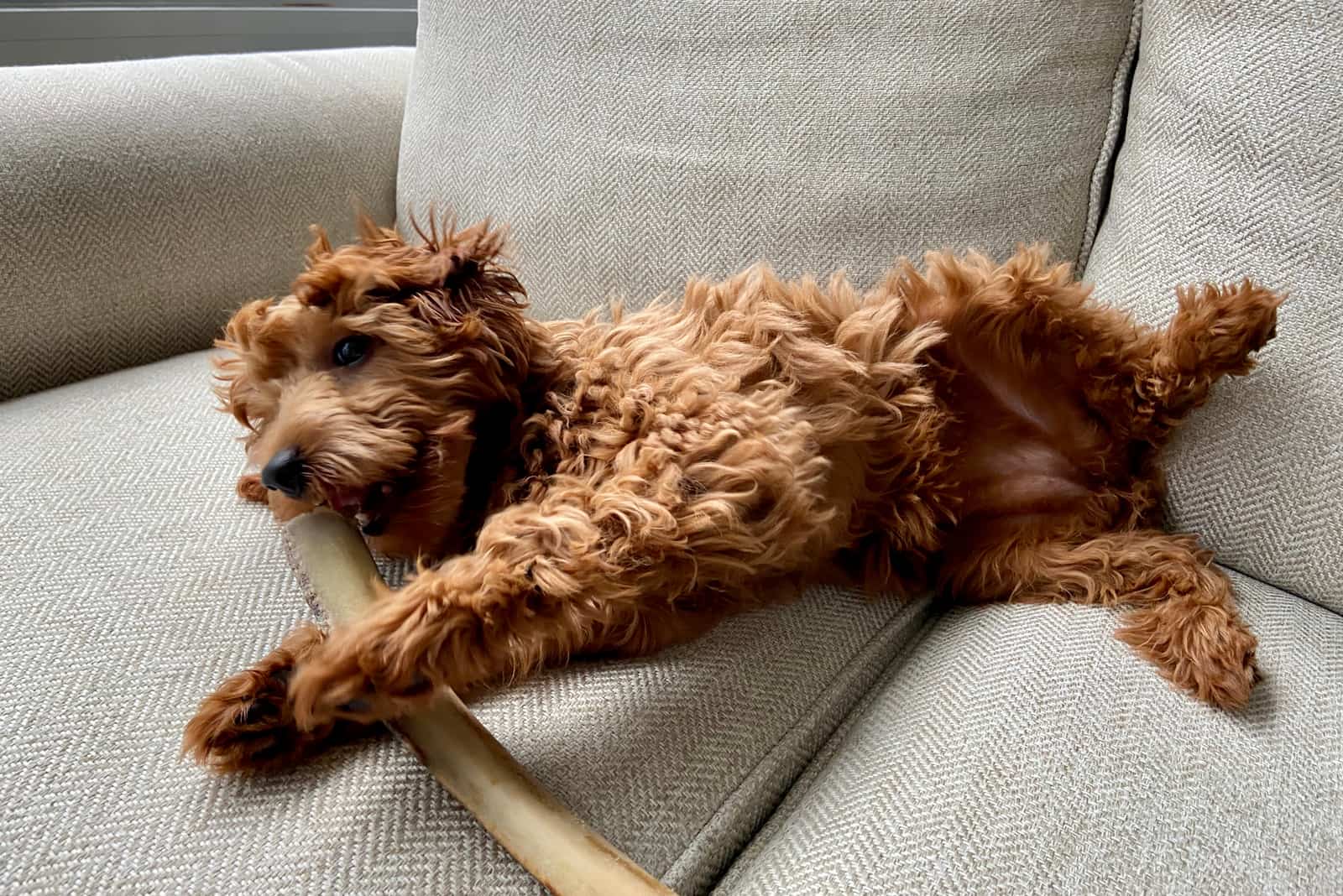
Studies among Doodle dog owners indicate that there is no clear winner here!
Out of the Labradoodle, Aussidoodle, Bernedoodle, and Goldendoodle, all of them scored very highly, although the first two had slightly less favorable results than the Bernedoodle and Goldendoodle.
So, the Goldendoodle is still a good choice if you want a low-shedding Doodle dog.
Even so, you have to get a Goldendoodle with a wavy or curly coat: those with straight coats will shed more than the curly or wavy-coated dogs. They may also be more prone to seasonal shedding.
One tip when choosing your puppy is to find one with facial hair, as these will have the Poodle coat.
If you’re looking for a really low-shedding dog (perhaps because of allergies), it’s best to get an f1b Goldendoodle.
If you’re unfamiliar with this term, it simply refers to the pup’s generation. So, an f1 Goldendoodle is the first generation, a 50:50 mix of the purebred Poodle and Golden Retriever.
An f1b Goldendoodle is back-bred, meaning that it is a mix of an f1 Goldendoodle with a purebred Golden Retriever, producing pups that are 75% Poodle and 25% Golden Retriever. As a result, they are much more likely to have a low-shedding Poodle coat.
Caring For Your Goldendoodle Coat
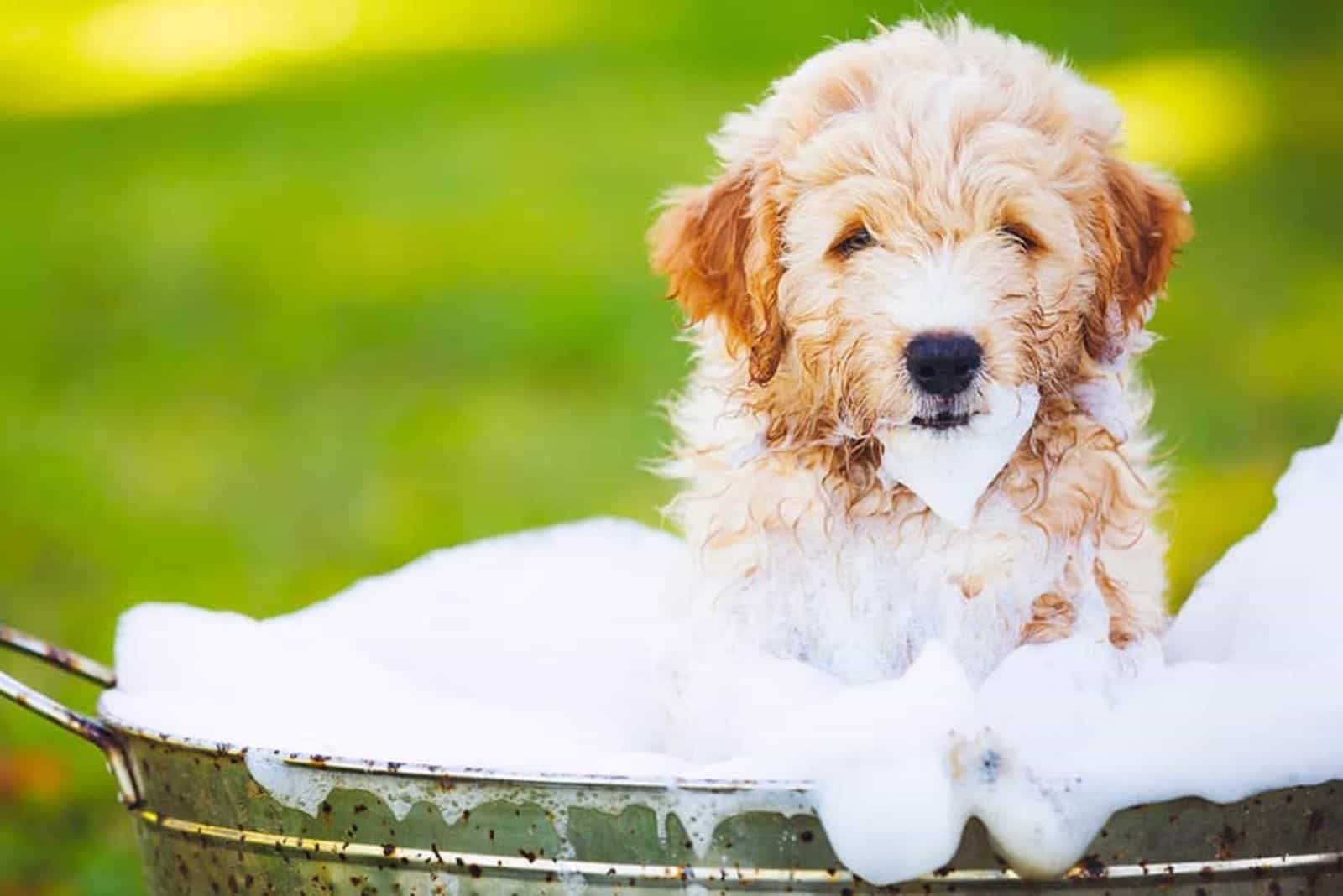
Although Goldendoodles shed less than other dogs, there are several ways to reduce this further still:
• Vacuum regularly (your floors, not your dog! ) as this reduces the amount of hair in your home
• Brush your dog frequently, outside if practical
• Bathe them every five to six weeks using doggy shampoo and conditioner
• Feed them high-quality dog food and supplements if required
• Ensure that your dog has enough exercise and mental stimulation, and avoid stressful situations as much as possible
• Get your dog checked out by the vet at least twice a year to catch any health problems early
By doing all this, you can make your home almost dog hair-free!
The Last Word: Do Goldendoodles Shed?
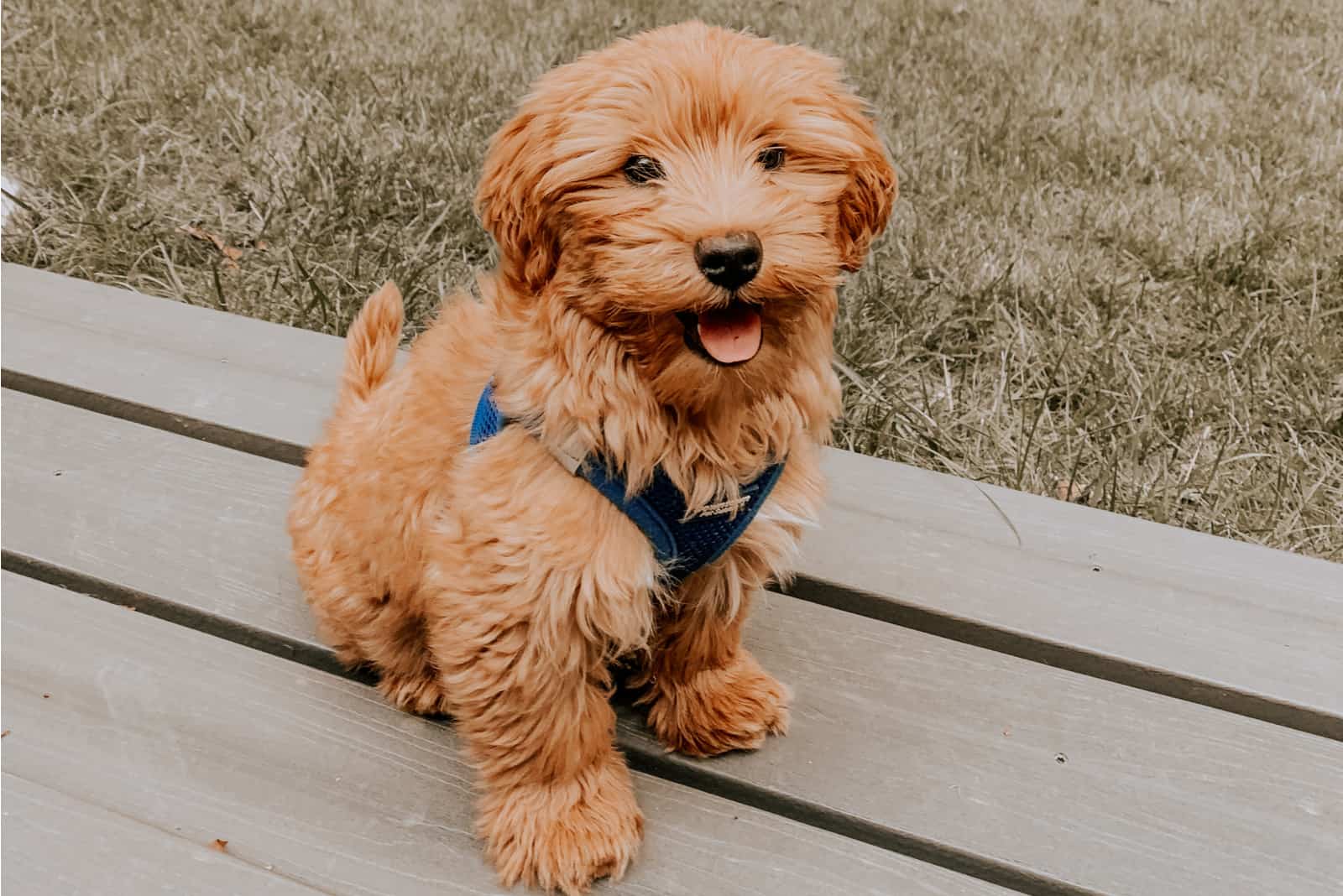
As we established from the start, Goldendoodles shed hair, just like any other dog. However, they are among the low-shedding breeds, especially those with wavy or curly coats.
Even so, as there are different generations of Goldendoodles, there may be variations in the amount they shed.
Remember; although the amount of shedding is linked to the Goldendoodle’s allergy-friendly qualities, this can’t be measured. An allergy sufferer may still have an allergic reaction!
Never shave your Goldendoodle’s coat off! Even shaved Goldendoodles might cause allergies, so this won’t fix your problem. Also, this can cause many problems for your dog.
Instead, you might want to check out these Goldendoodle haircuts!
If this is an issue, speak to the Goldendoodle breeder in your area to see if you can get an f1b Goldendoodle, as these are less likely to trigger allergies.
Finally, it’s not just about their coat. These incredible dogs make excellent family pets, and that low-shedding coat is a bonus!
Read Next: The Ultimate Guide To The Flat Coat Goldendoodle
